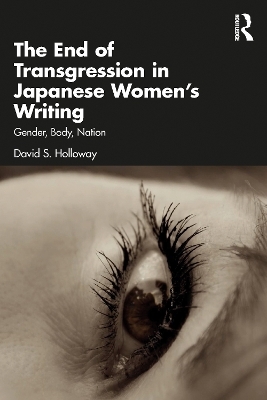
The End of Transgression in Japanese Women’s Writing
Gender, Body, Nation
Seiten
2025
Routledge (Verlag)
978-1-032-13984-5 (ISBN)
Routledge (Verlag)
978-1-032-13984-5 (ISBN)
- Noch nicht erschienen (ca. Januar 2025)
- Versandkostenfrei
- Auch auf Rechnung
- Artikel merken
This book argues for a new articulation of the ways in which transgression is theorised in contemporary literature by Japanese women.
Exploring the rhetorical and discursive mechanics of literary “bad girls” from fiction produced during the millennial turn (1990-2010), the book contends that women writers today deploy truant, unruly, restless, and aggressive female protagonists not to challenge the status quo, but rather to reaffirm it. While Japanese women’s fiction has long been invested in cultivating an uncomfortable politics of opposition through “unladylike” themes such as sex, sexuality and violence, the book argues that today authors turn to such acts of defiance to quietly advocate for the primacy of Japanese social order. Showing how transgression has not only lost its political and disruptive valence in contemporary women’s fiction, this book further reveals how discourses of dissent can be retooled to promote a conservative worldview.
A fascinating literary analysis which reads Japanese literature in relation to the receding value of rebellion today, this book will be of huge interest to students and scholars of Japanese literature, gender and cultural studies.
Exploring the rhetorical and discursive mechanics of literary “bad girls” from fiction produced during the millennial turn (1990-2010), the book contends that women writers today deploy truant, unruly, restless, and aggressive female protagonists not to challenge the status quo, but rather to reaffirm it. While Japanese women’s fiction has long been invested in cultivating an uncomfortable politics of opposition through “unladylike” themes such as sex, sexuality and violence, the book argues that today authors turn to such acts of defiance to quietly advocate for the primacy of Japanese social order. Showing how transgression has not only lost its political and disruptive valence in contemporary women’s fiction, this book further reveals how discourses of dissent can be retooled to promote a conservative worldview.
A fascinating literary analysis which reads Japanese literature in relation to the receding value of rebellion today, this book will be of huge interest to students and scholars of Japanese literature, gender and cultural studies.
David S. Holloway was Assistant Professor of Japanese at the University of Rochester, USA.
Introduction. “Literary Dislocations: Rediscovery and Reorientation” 1. “The Legacy of Transgression in Japanese Women’s Fiction: Liberation, Liberty, Lightning” 2. “Class, Identity, and Recession in Millennial Japan” 3. “Skeletons of Desire: The Body in Kanehara Hitomi’s Snakes and Earrings and Hydra” 4. “Gender and Body, Past and Present: Sakurai Ami’s Innocent World and Tomorrow’s Song” 5. “The Two Bodies of Kirino Natsuo: Grotesque and Real World” 6. “Conclusion: Chaos, Schizophrenia, and Reconciliation in Millennial Japan” Epilogue
| Erscheint lt. Verlag | 21.1.2025 |
|---|---|
| Verlagsort | London |
| Sprache | englisch |
| Maße | 156 x 234 mm |
| Themenwelt | Geisteswissenschaften ► Sprach- / Literaturwissenschaft ► Anglistik / Amerikanistik |
| Geisteswissenschaften ► Sprach- / Literaturwissenschaft ► Literaturwissenschaft | |
| Sozialwissenschaften ► Soziologie ► Spezielle Soziologien | |
| ISBN-10 | 1-032-13984-6 / 1032139846 |
| ISBN-13 | 978-1-032-13984-5 / 9781032139845 |
| Zustand | Neuware |
| Haben Sie eine Frage zum Produkt? |
Mehr entdecken
aus dem Bereich
aus dem Bereich
Poetik eines sozialen Urteils
Buch | Hardcover (2023)
De Gruyter (Verlag)
CHF 83,90
Entzauberung und Faszination des Immergleichen in Literatur und Film
Buch | Softcover (2024)
Springer Fachmedien Wiesbaden GmbH (Verlag)
CHF 118,95
Buch | Softcover (2024)
belleville (Verlag)
CHF 27,95


